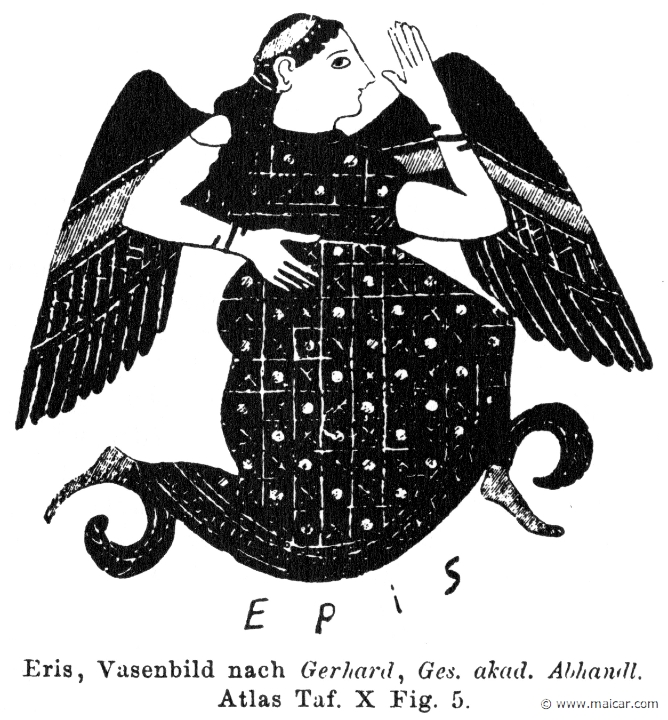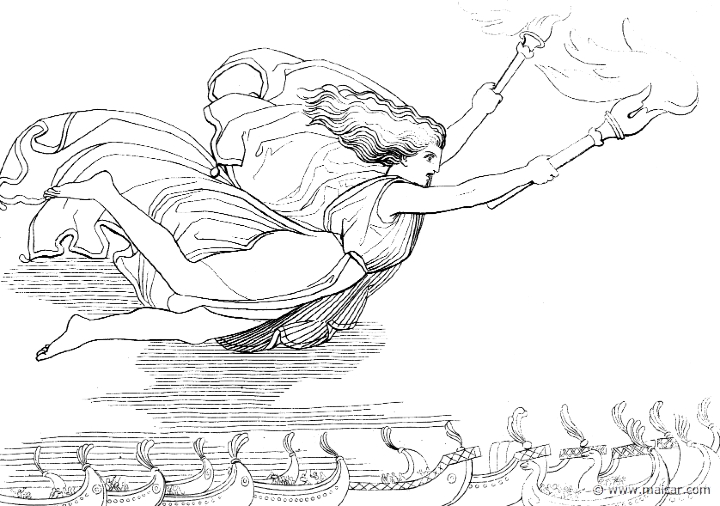|

|
RI.1-1338: Eris, Vasenbild nach Gerhard, Ges. akad. Abhandl. Atlas Taf. X Fig. 5. Roscher, 1884.
|
|
|
"Discord strides exulting
in her torn mantle, followed by Bellona wielding a
bloodstained scourge." (Virgil, Aeneid 7.702).
|
|
Eris is Discord, and may be called strife and
quarrel as well.
Nurse of War
Eris has been said to be the daughter of Nyx, but she has also been
called the sister of Ares and the nurse of War, since she helps her brother
in arms to accomplish his bloody work. And enjoying
the groans of dying men, she fills their hearts
with hatred, so that they may slay each other.
Famous trouble caused by Eris
Being of such a deplorable nature, the gods have
kept Eris apart, and as it is widely known, she was
not in the list of guests who were invited to the
wedding of Peleus and
Thetis, the parents of Achilles. Nevertheless,
Eris, being difficult to get rid of, came to the
party and threw a golden apple through the door
with the inscription:
"For the
fairest"
And Hera, Athena and Aphrodite started
disputing on account of the apple, and were
therefore sent by Zeus to
Mount Ida near Troy in
order to be judged by the shepherd Paris, who chose Aphrodite as the most
beautiful, accepting Helen's hand for a bribe.
Consequences of that trouble
This is one cause of the Trojan War, for Paris, having come to
fetch his bribe at Sparta, where Helen was queen, left the
city as her lover and sailed with her to Troy. But her husband Menelaus and his
brother Agamemnon, against all odds—for war had never before broken up for the sake of a woman—sent a powerful army against Troy,
and produced a conflagration that still today
causes such an awe and amazement as if the flames
of Troy were still burning.
Loved by no one, and yet possesses many
The cruel works of Eris foster battles and wars,
awake the minds and hearts of mortals, and set them
in motion to exchange death for death, as did the Pelopides Atreus and Thyestes 1, or the sons of Oedipus.
Although no one loves her, which is seen in that
artists represent her as a most repulsive woman,
many are possessed by her and mortals must pay Eris
her due, following the will of the gods; yet it has
been said that discord among mortals displeases Zeus.
Little at the beginning, becomes soon a giant
When Eris causes a dispute, she has at the
beginning an insignificant appearance, but as they
say, she soon reaches heaven with her head while
having her feet still on the ground. And there is
no disagreement between the contenders concerning
Discord itself, for they usually agree in carrying
the quarrel as far as they deem it necessary, which
normally is, as some put it, "to the bitter end",
since those possessed by contention never stop
agreeing in the necessity of letting division
prevail. That is why there is no end to quarrels
until some other force takes Eris' place, for
nothing can be expected from this cruel divider to
end a strife:
"Discord is
the last of the gods to close an argument." (Antigone 2 to a
Herald. Aeschylus, Seven
Against Thebes 1057).
But when Eris leaves, the state of harmony that
was previously enjoyed returns, for harmony has no
part in discord.
|

|
Eris | il211flax: "Zeus sent forth Eris unto the swift ships of the Achaeans, dread Eris, bearing in her hands a portent of war." (Hom.Il.11.4) John Flaxman (1755 – 1826).
|
|
Discord inside
Similarly, in one and the same person, if the
body is in harmony then health prevails, and if the
mind is in harmony then happiness prevails. But
when Discord makes herself master of body and mind,
disease and madness ravage both. And this is likely
to happen when things fall out of proportion, or
when the mind is torn apart by opposite opinions
and desires. For a diseased mind is like a melody
out of tune, which ignorant of the laws of harmony,
falls in discordant noise or dissonance. That is
why it has been said that nothing is worse than to
live in internal discord and contradiction in one's
own single self. When in musical performances harmonies and
rhythms are not adapted to each other, or songs are
provided with unsuitable accompaniments, or theme
and tune disagree, Discord finds her place in that
art, and turns music into ugly noise, painful to
the ear and to the heart that must endure it. And the same occurs when Justice, who nourishes
harmony in human affairs, is banished; for when she
leaves Discord takes her place. And when Eris and
her children have made themselves at home,
Lawlessness takes over, and simple Quarrel ends in
Murders, and Disputes feed in Lies, and Oath comes
to trouble the forsworn, and Battles and Fightings
ensue, leading the whole community to Ruin and
filling it with Sorrows, Toil and Famine.
Unavoidable goddess
But some think that Discord cannot be avoided,
arguing that equality and fairness have no
existence beyond the name. Accordingly, they do not
hesitate, when they deem it necessary in order to
achieve the attractive aims that Eris whispers in
their ears, to plunge family, friends and country
into darkness in order to win, through debauched
contention, whatever they fancy to be of
unsurpassable value, be it gold, power, Fame, or anything that
these three may provide.
Fearful goddess
Discord do not say to mortals "look at my repulsive face, be nasty against your neighbors", but instead stirs up everybody to win pre-eminence, letting them be persuaded of their own superiority, or that their rights should come first. That is why they say:
"Truly Eris is
a goddess to fear." (Euripides, Phoenician
Women 799).
since it is clear that there are no troubles
that this hard-hearted goddess cannot devise.
|

|
Night, mother of Discord. 8834: Allegorisk kvindefigur, 'Natten'. Michelangelo Buonarotti (1475-1564), 1526-31. Firenze, San Lorenzo, Sagrestia Nuova. (Royal Cast Collection, Copenhagen).
|
|
Two Eris
Seeing that Eris is often present in the life of mortals, some distinguish two kinds of strife. One of them, they say, is she who causes war and battles, and the other is she who makes a man grow eager to work by showing him the prosperity of his neighbors. This Eris, they add, is wholesome for men, since she, creating enmity between craftsman and craftsman, and causing beggar to be jealous of beggar, and minstrel of minstrel, makes them all hurry after wealth.
The poet's counsel and rule
For these reasons, they affirm, this Eris may be
worthy of praise, whereas the Eris who delights in
mischief should be avoided. For the latter holds
men back from the work that will make their fortune
and right, keeping them close to troubles, wangles,
court-houses, and the like. And observing these
realities, the poet Hesiod established this rule:
"He has no
time for courts and public life
Who has not stored up one full year's
supply."
(Hesiod, Works
and Days 30).
|